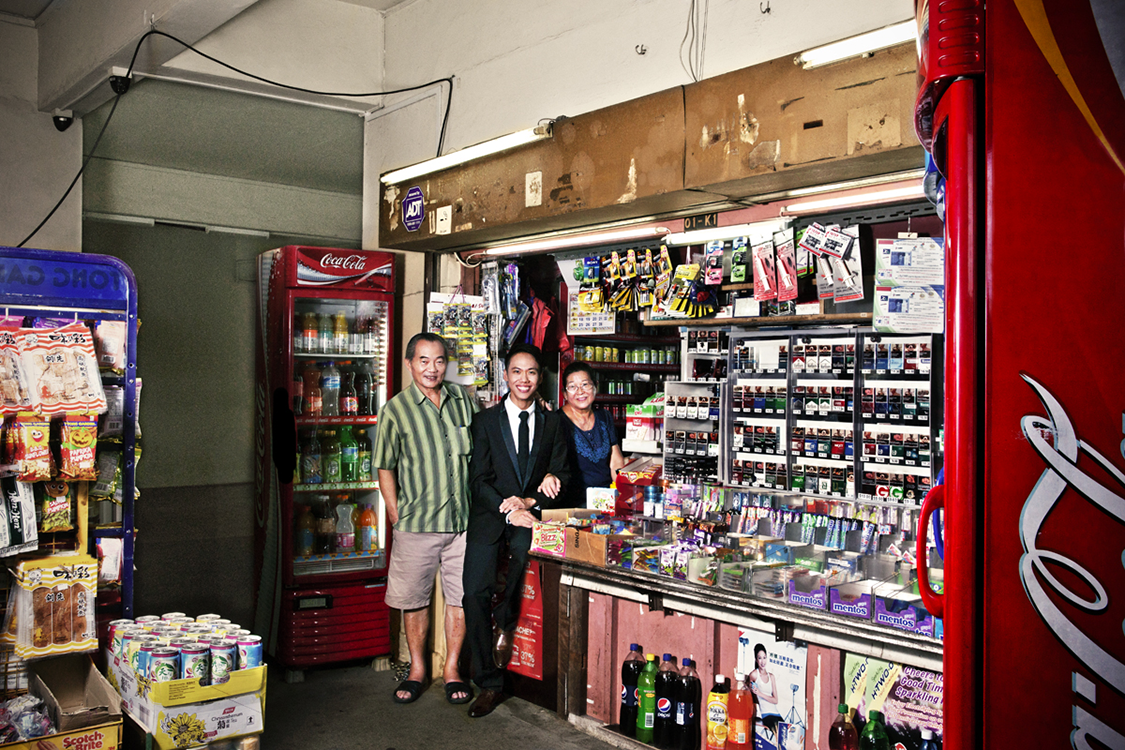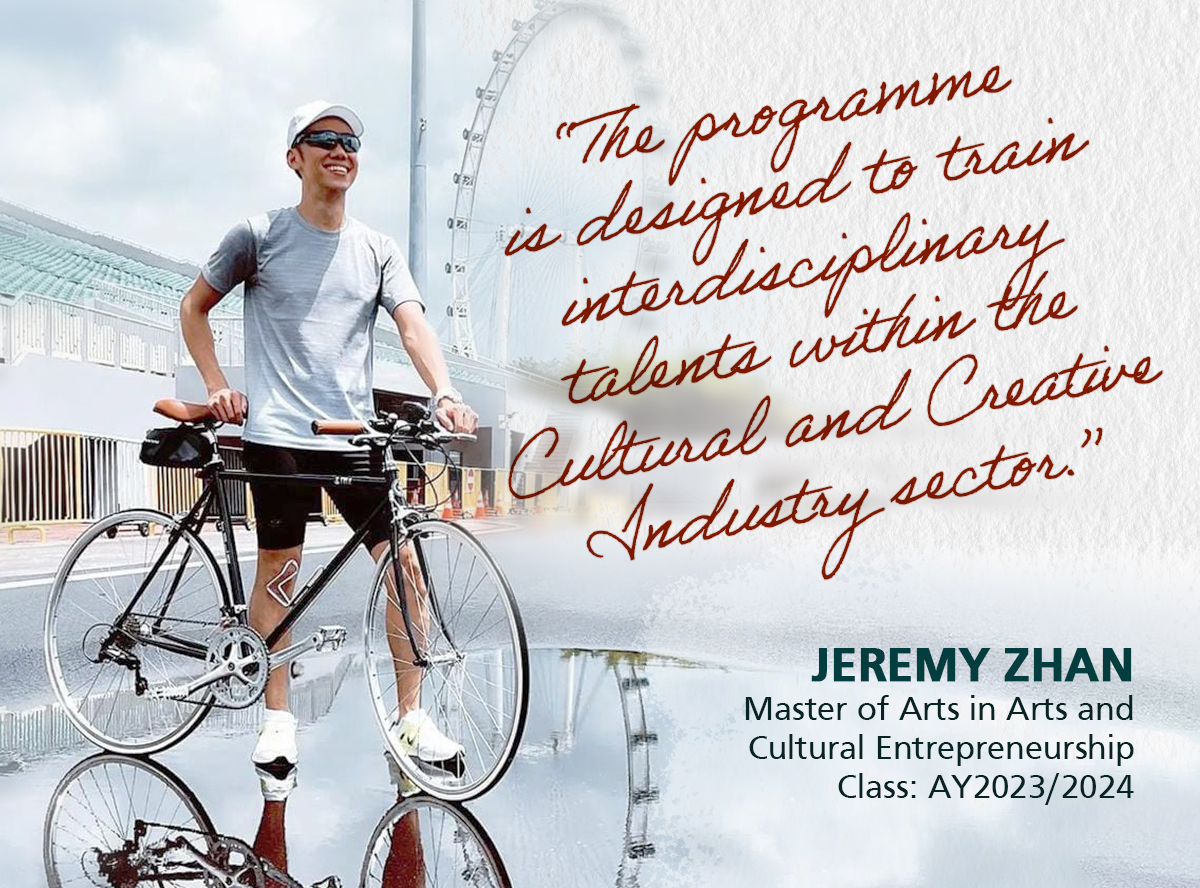11 Jan 2024 — Jeremy Zhan seems to be constantly in motion. Throughout university and his working career, he has established businesses, worked in the Civil Service (where he planned and implemented community arts, sports, educational and service-learning programmes for families) and pursued his photography hobby. Despite all the activities he has immersed himself in, he will tell you that his core interest lies in heritage and culture—a field he has always wanted to work in.
Planning to make the transition into the field of Arts and Culture, the lecturer teaching in Sports, Health and Leisure, has taken up the Master of Arts in Arts and Cultural Entrepreneurship (MA (Arts and Cultural Entrepreneurship)) programme at the National University of Singapore (NUS).
We caught up with Jeremy to gain some the insights into what he thinks of the programme and what his future career plans might be.
Why did you decide to take up the MA (Arts and Cultural Entrepreneurship)?
I have always been passionate about local heritage, culture and people. Photography was my medium of choice in that arena, and I used it to good advantage in the final year project for my undergraduate studies: the documentation of Singapore’s disappearing traditional trades and the people involved in these sunset trades.

Jeremy Zhan (middle), with business owners whom he photographed for his documentary project "Vanishing Trades"
I believe that it is important to be able to keep my finger on the pulse of what is happening in the Arts scene, and this is one of the advantages that the Master’s Degree programme has provided me with. Keeping myself close to the ground and knowing what is happening in the industry is invaluable as it allows me to have an insider’s perspective. This type of knowledge is something only people who are working within the industry would gain hands-on, through experience.
Another advantage is that the programme is designed to train interdisciplinary talents within the Cultural and Creative Industry (CCI) sector. Understanding that not everyone who pursues a career in the CCI sector is a creative talent, the Master’s Degree allows for development in vital areas that are often out of the spotlight, such as the management and leadership of arts and cultural organisations, resources and infrastructures.
Which courses did you enjoy in the programme?
One of the courses that stood out was SE5263 (Cultural Resources Management in South-East Asia). The course chair was Dr Hamzah Muzaini, a professor who is passionate about the heritage and culture of the local community. The weekly discussions on managing cultural products were engaging and insightful. I also found the expedition to St John’s Island eye-opening and meaningful. I got to learn about its history and worked with Dr Hamzah on strategies to better manage the tangible and intangible cultural resources of the island.
Courses ACE5404 (Heritage: Peoples and Institutions) and ACE5409 (Applied Arts Research and Practice) were taught by Dr Imran bin Tajudeen, who specialises in Southeast Asian architecture. We learnt about urban development frameworks, policies and people in the Heritage: Peoples and Institutions course and it raised thought-provoking questions like “How can urban conservation preserve cultural heritage and simultaneously boost the economy?” Through site visits to the Urban Redevelopment Authority (URA) and precincts that are gazetted under conservation like Chinatown and Kampong Glam, I learned about the history of Singapore and was able to better understand how the state manages these areas. It was interesting to delve into the finer details of policies and how they contribute to the image of Singapore as a liveable city where people can live, play and work better.
In addition, the Applied Arts Research and Practice course taught me the knowledge and skills to identify potential in heritage and transform society. Tangible and intangible heritage contribute to a sense of belonging and identity, and therefore shape the community we live in.
ACE5401 (Approaches to Arts & Cultural Entrepreneurship) was a great opportunity to meet entrepreneurs and understand what being an arts and cultural entrepreneur is like. Through my interactions with business owners, I learned how they deploy cultural resources in their ventures. Since the goal of a business is to make money, the challenge is ensuring that their products and services have cultural value while being profitable.

NM5218 (Cultural Policy) provided me with the knowledge to evaluate specific instances of cultural policy development in Singapore. It helped me understand how policies were developed for the betterment of the country and her people.
What type of jobs does your programme prepare you for, and are there any roles in particular that you are interested in?
The MA (Arts and Cultural Entrepreneurship) has prepared me for a career in Arts and Culture. The courses have helped me develop essential skills such as building social capital among the community, urban development placemaking efforts, arts and cultural curatorship, and community development for arts and culture.
In terms of my career, I would like to dedicate my time and effort to manage precincts rich in heritage and culture, either as an arts administrator or entrepreneur. This is to ensure our future generations can learn about the early years of Singapore, and to not take our history and how far we have come for granted. Heritage is not just about preserving traditions or memories, but also how we can better manage resources to make them accessible, interesting and fun for the next generation.
What keeps you going despite your busy schedule?
I strive to make a difference by changing and adapting to the world we live in today. I also take time to appreciate and reflect on the good things in my life to cultivate a positive mindset and increase happiness. It is important to make time for the things that matter to me which can be challenging at times. This forces me to re-centre myself and ensure I remain on track to progress and meet my goals.
The arts and culture scene is an area which I hold dear to my heart and wish to be working in.
Right now, I am getting the best of both worlds. I am gaining knowledge about the arts and culture scene from the MA (Arts and Cultural Entrepreneurship) programme, while concurrently growing in my career. Knowing these two goals are on track, as well as always looking on the positives of life, gives me the drive to carry on.